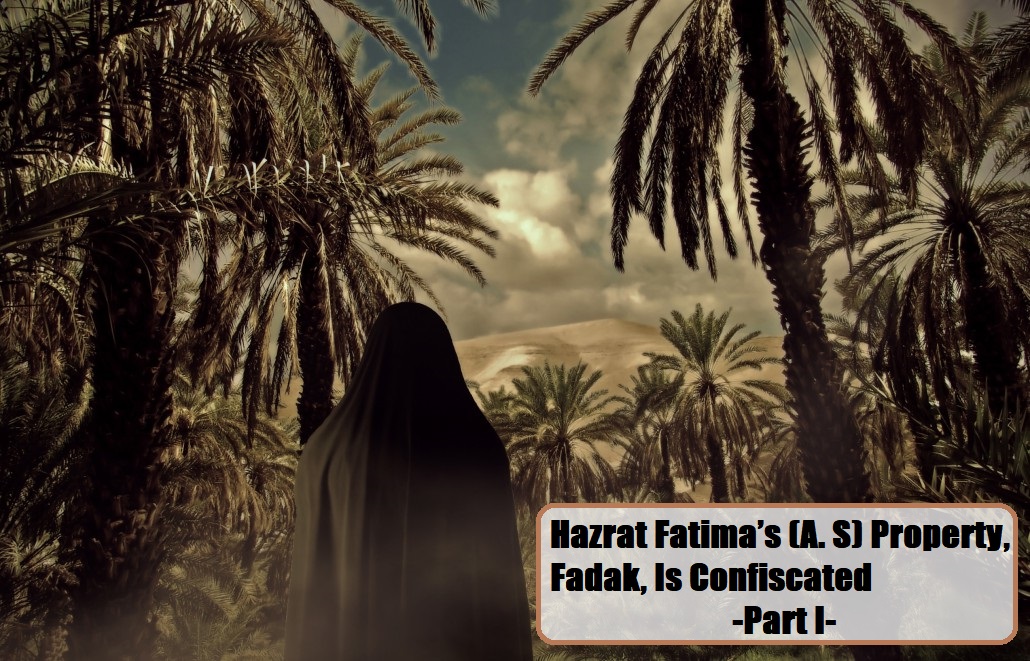The Muslims who had migrated to Medina had left behind all their unmovable properties in Mecca. All such Muslims were paid back by the Prophet from the revenues and wealth obtained from “Maale Ghanima” (war booty), ^he last person to be paid back in this way was Hazrat Fatima (A.S).
Hazrat Fatima (S.A) had inherited unmoveable property from her mother Khadija in Mecca. On migrating to Medina she lost all these properties. But her father, the Prophet (S.A.W.W) had decided not to compensate her until everyone else was compensated. She was compensated in 7 A.H. with the estate of Fadak.
The estate of Fadak was a personal property of the Prophet. It was obtained by the Prophet without a war. It belonged fully to him and he could do with it whatever he wished.
How did the Prophet get the estate of Fadak?
After the battle of Khaiber, those Jews who lived in the neighbourhood of Kheiber but had not fought the Muslims, decided to make peace by offering the Prophet (S.A.W.W) parts of land that belonged to them The Prophet (S.A. W.W.) agreed and the Jews gave him Fadak.
Fadak was located in the neighbourhood of Khaiber In those days it was about two to three days walk from Medina. It was made of seven villages. It was very fertile and had been fully put to agricultural use.
The Prophet (S. A. W.W) got half of the Fadak. At the time of the Prophet (S. A. W.W), the yearly income from Fadak was about 20,000 dinars. The revenue was collected in three instalments. Out of this revenue Hazrat Fatima (S.A) took just enough money for food for her children. The remaining revenue was spent after the needy.
According to Abu Said Khudri, the Prophet gave Fadak to Hazrat Fatima (S.A) when the following verse of the Quran was revealed to the Prophet:
“And give to the near of kin his due and to the needy and the wayfarer…”(7:26).
That the Prophet (S.A.W.W) himself gave Fadak to Hazrat Fatima (S.A) has been confirmed by such scholars as Ibne Hajhar Makki, Ahmed Ibne Hambal and Ibne Abil Hadid.
Hazrat Fatima hired people to take care of Fadak. This arrangement continued for four years until the death of the Prophet (S.A.W.W). Then the government took Fadak away from Hazrat Fatima (S.A).
Hazrat Fatima (S.A) went to complain against this injustice in the court of Abu Bakr. As a matter of fact, Fadak had been taken away from her on Abu Baqr’s orders.
Hazrat Fatima (S.A) first complained that Fadak was her property which the Prophet (S.A.W. W) had given to her as a gift during his lifetime. Abu Baqr asked her to produce witnesses to support her claim. When she produce her witnesses, he rejected them. Her witnesses were Imam Ali (A.S)Jmam Hasan (A.S), Imam Husain (A.S) and Um Ayman.
Abu Bakr rejected Imam AH (A.S) because he was her husband. He refused to accept Imam Hasan (A.S) and Imam Husain (A.S) because they were too young! He refused Um Ayman as a witness because she was a woman! When all her witnesses were not accepted, Hazrat Fatima (S.A) brought another reason why she should get back Fadak.
She asked it to be given to her as her Father’s inheritance. Abu Bakr refused to do so saying that he had heard the Prophet say that “We, the group of Prophets do not inherit nor are we inherited; what we leave is for Alms.”
No one else had ever heard this “Hadith” before. Hazrat Fatima argued that the Prophet could never have said such a thing as it is totally against Quran. She quoted the following verses of the Quran which prove her point:
“… and Sulaiman inherited Dawood …” (27:16) . Nabi Zakaria prays to Allah saying, “Therefore give me a heir, who shall inherit me and inherit The House of Yakub”.(19:5, 6).
“And those of you (who are ) related by blood have rights over one another in the book of Allah.”(8:75) . “Allah orders you about your children; the male shall have the equal of two (parts of the females) (4:12) .
Bequest is prescribed for you when one of you nears death, if he leaves wealth, it is to be inherited by his parents and near relations.“(1:80) .
Abu Bakr still refused to return to Hazrat fatima (S A) what rightly was hers.
Source:
A Brief Biography of Hazrat Fatima (A.S.), [Pg. 32-34].
By: M.M. Dungersi Ph.D.

